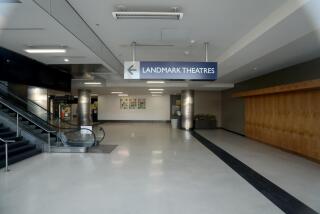Put your mind at ease
- Share via
For years, after-hours medical clinics have helped people with urgent, but not life-threatening, physical problems. Now, the concept is being applied to mental health needs.
Instead of high fevers, sprained ankles and sore throats, county-funded Mental Health Urgent Care Center in Long Beach treats schizophrenia, depression, drug addiction and other mental disorders. The 24-hour center -- which may be the first of its kind in the nation -- is desperately needed, county health experts say.
While someone with a minor physical ailment might be able to put off seeing a doctor, a worsening mental illness can rapidly become dangerous. County health officials have long bemoaned the number of people with mental illness who end up homeless, jailed or hospitalized because they lacked routine mental health care or couldn’t wait until office hours to see their doctors.
“Normally these folks go to the emergency room or get picked up by police,” said Dr. Debbie Innes-Gomberg of the L.A. County Department of Mental Health. “Here they can get an evaluation or a prescription or a meal or, sometimes, just a clean pair of pants and a shirt. That is so unique.”
Many counties have mental health crisis centers or daytime clinics. But the concept of an all-hours, walk-in clinic for the mentally ill, although new and untested, holds particular promise.
The Paramount Boulevard clinic, which opened in May, is not for everyone. People who are a danger to themselves or others legally can be confined to a mental hospital. But, treatment at the center is voluntary, says Ed Bienkowski, a clinical psychologist and administrator of the center.
The center’s small staff, which includes a psychiatrist and a few psychiatric nurses, aims to apply a Band-Aid -- with medication, counseling or a referral for specialized treatment -- to problems that could quickly escalate. So far, the center has drawn a variety of clients from throughout Los Angeles County, from a college student grief-stricken over a busted romance to a disoriented, homeless woman fresh off a bus from the Midwest.
William Barfield, 48, went to the center one night after he began hearing voices. He was in a residential treatment program for drug and alcohol abuse at the time and worried that telling someone might result in his removal from the residence.
“I felt a little embarrassed about saying anything,” he said, sitting in the clinic’s lounge the next morning. “I’m the type of person who doesn’t feel comfortable talking to just anyone.”
He confided in a social worker who had helped him in the past, however, and she brought him to the Mental Health Urgent Care Center. The doctor there reassured Barfield, prescribed medication and referred him to the Long Beach Mental Health Center for follow-up treatment.
“This was very convenient,” said Barfield, a Los Angeles native who said he has worked as a firefighter and bus driver. “I’ve gone to [the hospital] before and have waited 16 to 20 hours before being seen. Here, I didn’t sit more than 30 minutes.”
Studies show that 75% to 90% of people who seek emergency room care for mental illnesses are hospitalized, often because there are no other alternatives, Bienkowski said.
“We’re the other way around,” he said. “Hospitalization is usually our last option. This [center] should save money in hospital beds, psychiatric emergency room care and, indirectly, save the police money.”
Since its opening, only 6% of the roughly 500 clients seen at the center have been referred for hospitalization.
That’s an admirable rate, Bienkowski said, since most of the center’s clients (they must be at least age 18) have already been diagnosed with depression, manic depression, schizophrenia, severe anxiety or drug or alcohol problems that coexist with a mental illness. Many are indigent or receive publicly funded care in the county’s overburdened mental health clinic.
Sometimes, Bienkowski said, the center provides a day of “respite care” to a person who is having problems getting along with family members or in a board-and-care facility. “We had a man whose mom called the police because she said her son pulled a knife on her,” Bienkowski recalled. “The police didn’t feel they could legally hold him and brought him here. He spent the night and the next morning his mom was willing to take him back in.”
Clients can stay at the center for 24 hours -- usually enough time to provide initial treatment and a referral for follow-up care, he says.
The county views the center as a pilot project that could be expanded if it proves successful, Bienkowski said. He is conducting a study to see if the center meets its objective of reducing incarcerations and hospital emergency room visits in Long Beach, where three-quarters of the clients reside. In the meantime, a similar center was recently opened in Alameda by Telecare Corp., which also operates the Mental Health Urgent Care Center for the county.
In researching plans for the clinic, county mental health officials conducting a nationwide review could find nothing like it. “This is something I think people will look at as a new model,” Bienkowski said, adding that people have already begun to ask him “when someone will open a center like this in a town near them.”
More to Read
Sign up for Essential California
The most important California stories and recommendations in your inbox every morning.
You may occasionally receive promotional content from the Los Angeles Times.













